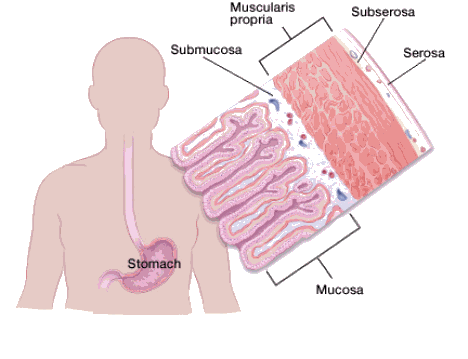Stomach Cancer
Eating can be one of life’s greatest pleasures. When stomach (gastric) cancer threatens your digestive system, the experts at University of Michigan Rogel Cancer Center can help. We offer customized treatment plans to help you feel better and get back to enjoying the foods you love.

credit: Chris Hedly
Stomach Cancer Care: Why Choose Rogel Cancer Center?
Our gastrointestinal cancer care team provides precise diagnosis and comprehensive care for all stomach cancers. Program highlights include:
- Demonstrated expertise: Each of our advanced subspecialists brings a high level of expertise to treating stomach cancers. You can count on the skills and experience of our board certified and fellowship-trained specialists. Meet our team.
- Care focused on you: Our patient-centered approach ensures you get the care that’s right for you. We work together — and with you — to develop personalized cancer care plans.
- Leading-edge treatments: From robot-assisted surgery and advanced systemic therapies to hyperthermic (heated) intraperitoneal chemotherapy (HIPEC), we offer the most advanced treatment options. You have access to the most sophisticated tools to treat stomach cancer.
About Stomach Cancers
Your stomach receives the foods you eat. When you swallow, food moves through your esophagus and into the stomach. The stomach then separates nutrients your body needs from waste materials that it doesn’t.
Five layers of tissue make up the stomach:

- Mucosa: Innermost layer of the stomach made up of mucus-producing glands.
- Submucosa: Second innermost layer composed of blood vessels, nerves and connective tissue.
- Muscularis propia: Middle layer composed of muscles that help move food through the digestive tract.
- Subserosa: Second outermost layer made of connective tissue and lubricating fluid that makes it easier for the stomach to move.
- Serosa: Outermost layer made of a thin membrane that covers the stomach.
Gastric cancers can occur when cells in any of these layers grow in abnormal ways. Most often, cancers begin in the mucosa and grow into the outer layers.
Stomach cancer symptoms may be mild or more severe and may mimic other digestive conditions. When stomach cancer first develops, you may have symptoms such as:
- Abdominal bloating, discomfort or nausea, especially after you eat
- Appetite loss
- Indigestion or heartburn
As gastric cancer worsens (advances), you might have:
- Bloody stools
- Fluid build-up in your abdomen (ascites)
- Jaundice
- Pain in the stomach
- Unexplained weight loss
- Swallowing problems
Stomach cancer types include:
Adenocarcinomas of the stomach
Cancers in the gland cells that line the mucosa are the most common stomach cancer type. They make up about 95% of all stomach cancers. Adenocarcinoma types include:
- Intestinal: Cancer cells in intestinal adenocarcinoma may have changes (mutations) in certain genes. Experts can often identify these mutations and use drugs called targeted therapies to treat them to help eliminate cancer while sparing healthy tissue. Intestinal adenocarcinoma is the most common type of stomach adenocarcinoma.
- Diffuse: Cancer cells in diffuse adenocarcinomas are more likely to spread. These cancers may grow more quickly. Diffuse adenocarcinomas are a less common type of stomach adenocarcinoma.
Less common types of stomach cancer
Other cancer types can also begin in the stomach. These cancers include:
- Gastrointestinal stromal tumors (GISTs): Tumors that can form anywhere in the digestive tract, including the stomach.
- Neuroendocrine tumors: Tumors that form in hormone-producing neuroendocrine cells found in the stomach.
The gastrointestinal cancer team at Rogel Cancer Center includes subspecialists with expertise in all stomach cancers. We begin by doing a physical examination and talking with you about any symptoms you’re experiencing. Our specialists identify all stomach cancer types with advanced diagnostic testing. We use:
Blood tests
Experts draw blood samples to check for certain proteins and substances that indicate cancer.
Endoscopy
During upper endoscopy, we insert a thin, flexible tube with a lighted camera (endoscope) into your mouth and down your throat. Specialists obtain detailed views of your esophagus, stomach and the beginning of your small intestine (duodenum).
During this test, experts may remove a small tissue sample (biopsy) for our pathology experts to examine under a microscope. They determine whether cancer is present and may also measure levels of certain genes or proteins to inform treatment decisions.
Imaging tests
Our stomach cancer experts use imaging tests to determine cancer’s location and whether it has spread (metastasized). We use this information to design customized treatment strategies. You may have:
- Barium swallow: We have you drink a metallic liquid (barium) to coat your stomach and make your digestive tract more visible during X-rays. Specialists take multiple images during this test, also known as an upper GI series.
- Computed tomography (CT) scan: Specialists take a series of X-rays that create detailed images of cancer’s location. We may inject or have you safely swallow dye to make cancer more visible during this test.
- Endoscopic ultrasound: Experts insert an endoscope and use high-energy sound waves to create images of tumors.
- Magnetic resonance imaging (MRI): Using radio waves and magnets, our radiology specialists look for cancer cells inside the layers of your stomach. We use these detailed images to see if cancer has spread.
We may use laparoscopy to diagnose stomach cancers. Specialists insert a thin instrument with a light and camera (laparoscope) through a small incision in your abdomen. They view the tumor’s location and may do a biopsy at the same time.
Stomach Cancer Treatment at Rogel Cancer Center
We treat all gastric cancers with personalized treatment plans designed to meet your unique health needs. Our stomach cancer experts give you access to the most advanced treatment options. We offer:
Radiation oncology for stomach cancer
Our radiation oncologists use advanced radiation techniques to treat stomach cancers. We may use radiation alone or in combination with chemotherapy (chemoradiation). Specialists use:
- External beam radiation: We use a machine to precisely target stomach tumors with high-energy beams. These beams help shrink tumors and relieve symptoms.
Surgery for stomach cancer
We use surgery to treat many stomach cancer types. Our expert surgeons have the expertise and experience to remove even the most complex stomach tumors. We offer:
- Subtotal gastrectomy: Surgeons remove the part of the stomach where tumors are located, along with nearby lymph nodes, tissues and organs that cancer affects.
- Total gastrectomy: Surgeons remove the entire stomach. They also remove affected lymph nodes and may remove part of the small intestine. In total gastrectomy, surgeons create a connection between your esophagus and small intestine so you can still eat.
Our experts also use surgical procedures when tumors aren’t completely removable (unresectable). These procedures help relieve pain, keep gastric pathways in the esophagus and stomach open, and preserve your ability to eat.
Systemic therapy for stomach cancer
Our medical oncologists use powerful medications to treat stomach cancer, including cancer that has spread to other areas. We use:
- Chemotherapy: Drugs that enter your bloodstream to kill cancer cells
- Immunotherapy: Drugs that help your immune system find and destroy cancer cells
- Targeted therapy: Drugs that attack — or target — specific cancer cells while sparing healthy cells
The expert oncology nurses at Rogel Cancer Center oversee delivery of systemic therapy infusions. You receive drugs in a vein (intravenously) through a thin, flexible tube (catheter). Our oncology nurses keep you comfortable and help you manage any treatment side effects.
Hyperthermic (heated) intraperitoneal chemotherapy (HIPEC) for stomach cancer
Our gastrointestinal cancer specialists use hyperthermic intraperitoneal chemotherapy (HIPEC) to kill stomach cancer cells that have spread to the abdominal lining (peritoneum). During surgery, experts bathe the abdomen with heated chemotherapy drugs. HIPEC helps destroy cancer cells that are often resistant to traditional chemotherapy.
Clinical trials at Rogel Cancer Center
Our gastric cancer researchers continually search for new ways to treat stomach cancer. You have access to the most advanced emerging treatments for gastric cancers. Talk with your care team to see if you’re eligible to participate in a clinical trial. Learn more about GI cancer clinical trials we offer for stomach cancer.
Multidisciplinary Gastric Cancer Care
The specialists at Rogel Cancer Center work together to treat all types of gastric cancer in our multidisciplinary clinics. Our specialist team offers access to expert diagnoses and the most advanced treatments for gastric cancers. The multidisciplinary approach at Rogel Cancer Center ensures you benefit from our team’s years of training, skill and experience.
Find GI Cancer Support Services
During treatment for gastric cancer, our caring team makes sure you have all the information, resources and support you need. Our patient navigators are there to support you and answer any question you may have. Learn more about GI cancer support services at Rogel Cancer Center.
Request an Appointment
Learn more about how we diagnose and treat stomach cancers at Rogel Cancer Center. Call 734-647-8902 to make an appointment.
